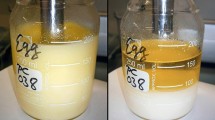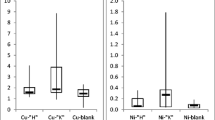Abstract
Background
Due to the bovine spongiform encephalopathy (BSE), specified risk material (SRM) as well as animal meat and bone meal (MBM) are banned from the food and feed chain because of a possible infection with pathogenic prions (PrPSc). Nowadays, prions are widely accepted to be responsible for TSE(transmissible spongiform encephalopathies)-caused illnesses like BSE and scrapie, and especially for the occurrence of the new variant of CJD in humans. Presently, SRM and MBM are burnt under high temperatures to avoid any hazards for humans, animals or the environment. The aim of this study was to evaluate a method using animal fat separated from Category I material which includes SRM and the carcasses of TSE-infected animals, or animals suspected of being infected with TSE, as a source for producing biodiesel by transesterification, analogous to the biodiesel process using vegetable oil.
Methods
For this purpose, animal fat was spiked with scrapie-infected hamster brain equivalents – as representative for a TSE-infected animal – and the biodiesel manufacturing process was downscaled and performed under lab-scale conditions.
Results and Discussion
The results analysed by Western blotting showed clearly that almost each single step of the process leads to a significant reduction of the concentration of the pathogenic prion protein (PrPSc) in the main and side-products.
Conclusion
The data revealed that the biodiesel production, even from material with a high concentration of pathogenic prions, can be considered as safe.
Recommendations and Outlook
The obtained results indicated that biodiesel produced from prion-contaminated fat was safe under the tested process conditions. However, it has to be pointed out that the results cannot be generalized because a different process control using other conditions may lead to different results and then has to be analysed independently. It is clear that the production of biodiesel from high risk material represents a more economic usage than the combustion of such material.
Similar content being viewed by others
Author information
Authors and Affiliations
Corresponding authors
Rights and permissions
About this article
Cite this article
Seidel, B., Alm, M., Peters, R. et al. Safety Evaluation for a Biodiesel Process Using Prion-Contaminated Animal Fat as a Source (6 pp). Env Sci Poll Res Int 13, 125–130 (2006). https://doi.org/10.1065/espr2005.08.283
Received:
Accepted:
Published:
Issue Date:
DOI: https://doi.org/10.1065/espr2005.08.283




